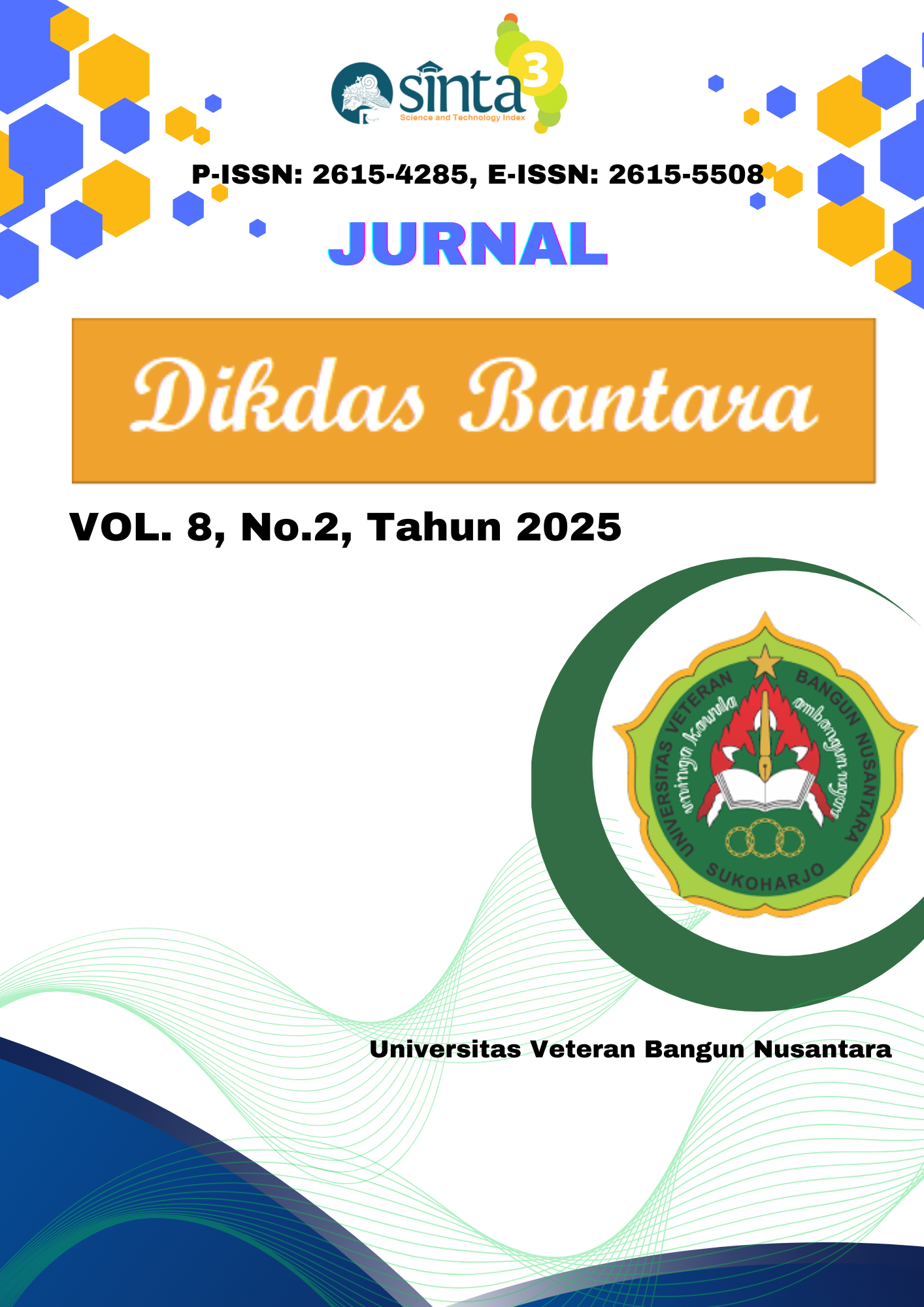Analisis Keterampilan Berpikir Kritis dan Kreatif dalam Pembelajaran Pendidikan Pancasila pada Program Sekolah Dasar Penggerak
DOI:
https://doi.org/10.32585/dikdasbantara.v8i2.7195Abstrak
Penelitian ini bertujuan untuk mendeskripsikan implementasi keterampilan berpikir kritis dan kreatif dalam pembelajaran Pendidikan Pancasila di Sekolah Dasar Penggerak dengan fokus pada Tahap B. Penelitian ini menggunakan pendekatan kualitatif dengan metode studi kasus, dan data disajikan secara deskriptif melalui observasi, wawancara, dan dokumentasi. Hasil penelitian menunjukkan bahwa perencanaan implementasi keterampilan berpikir kritis dan kreatif telah terstruktur dalam modul ajar. Selama implementasi, guru menerapkan strategi pembelajaran aktif seperti diskusi kelompok dan presentasi yang berhasil melibatkan siswa secara aktif dan memfasilitasi pengembangan keterampilan berpikir kritis dan kreatif. Evaluasi implementasi keterampilan berpikir kritis dan kreatif tidak hanya dilihat dari hasil belajar, tetapi guru juga menilai proses pembelajaran dan refleksi siswa. Pembelajaran Pendidikan Pancasila tidak hanya menekankan pada penguasaan konten, tetapi juga pembentukan pola berpikir kritis dan kreatif. Penelitian ini memberikan rekomendasi bagi guru untuk terus mengembangkan kemandirian siswa dalam berpikir dan mendokumentasikan proses pembelajaran secara lebih sistematis untuk mendukung peningkatan kualitas pembelajaran di masa mendatang.
Unduhan
Unduhan
Diterbitkan
Terbitan
Bagian
Lisensi
Hak Cipta (c) 2025 Kumala Berlianisa, Winarno, Fadhil Purnama Adi

Artikel ini berlisensiCreative Commons Attribution-ShareAlike 4.0 International License.
The copyright to this article is transferred to Jurnal DIKDAS BANTARA if and when the article is accepted for publication under Creative Commons Attribution-ShareAlike 4.0 International License. The undersigned hereby transfers any and all rights in and to the paper including without limitation all copyrights to Jurnal Komunikasi Pendidikan. The undersigned hereby represents and warrants that the paper is original and that he/she is the author of the paper, except for material that is clearly identified as to its original source, with permission notices from the copyright owners where required. The undersigned represents that he/she has the power and authority to make and execute this assignment.
We declare that:
1. This paper has not been published in the same form elsewhere.
2. It will not be submitted anywhere else for publication prior to acceptance/rejection by this Journal.
3. A copyright permission is obtained for materials published elsewhere and which require this permission for reproduction.
Furthermore, I/We hereby transfer the unlimited rights of publication of the above mentioned paper in whole to Jurnal Komunikasi Pendidikan. The copyright transfer covers the right to reproduce and distribute the article, including reprints, translations, photographic reproductions, microform, electronic form (offline, online) or any other reproductions of similar nature. The corresponding author signs for and accepts responsibility for releasing this material on behalf of any and all co-authors. After submission of this agreement signed by the corresponding author, changes of authorship or in the order of the authors listed will not be accepted.
Retained Rights/Terms and Conditions
1. Authors retain all proprietary rights in any process, procedure, or article of manufacture described in the work.
2. Authors may reproduce or authorize others to reproduce the work or derivative works for the author’s personal use or for company use, provided that the source and the Jurnal Komunikasi Pendidikan copyright notice are indicated, the copies are not used in any way that implies Jurnal Komunikasi Pendidikan endorsement of a product or service of any employer, and the copies themselves are not offered for sale.
3. Although authors are permitted to re-use all or portions of the work in other works, this does not include granting third-party requests for reprinting, republishing, or other types of re-use.












